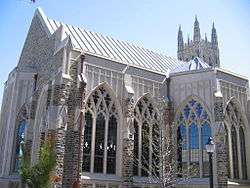Duke Divinity School

The Divinity School at Duke University in Durham, North Carolina is one of ten graduate or professional schools within Duke University. It is also one of thirteen seminaries founded and supported by the United Methodist Church. It has 39 full-time and 18 part-time faculty and over 500 full-time students. The current interim dean of The Divinity School is Old Testament scholar Ellen Davis.[1] Former deans include the prominent New Testament scholar Richard B. Hays who stepped down in 2015, and L. Gregory Jones.
History
The Divinity School was founded in 1926 as the first graduate school at Duke,[2] following a large endowment by James B. Duke, a tobacco magnate, in 1924. The Divinity School carries on from the original founding of Trinity College at the site in 1859, which provided free training for Methodist preachers in exchange for support from the church. Though the school is affiliated with the United Methodist Church, it is also ecumenical in outlook and has both faculty and students from a variety of denominations.
The Divinity School building was recently renovated and also expanded. The Hugh A. Westbrook Building, which opened in 2005, is 53,000 square feet (4,900 m2). It also contains the 315-seat Bishop W. Kenneth Goodson Chapel with 55-foot (17 m)-high ceilings, office space, a bookstore, cafe, outdoor patio, and a 177-seat lecture hall.
The school is perhaps most noted in American theological circles for serving as a fountainhead of postliberalism or narrative theology, a movement originating in the 1960s and 1970s at Yale Divinity School. This is thanks in part to the presence of Stanley Hauerwas, often considered one of the leading exponents of postliberal and narrative approaches to theology. Time Magazine named Hauerwas "America's Best Theologian" in 2001.[3]
Duke Divinity also benefits from the resources of the Duke Endowment, providing an outlet for this fund's support of higher education and the rural church in North Carolina. Resources from this endowment go towards student internships in rural North Carolina Methodist churches, further clergy development, and other programs.
Academics and Programs
The programs run through the school include the following.[4]
The Divinity School offers a Master of Divinity, Master of Theological Studies, and Master of Theology degrees. A Ph.D. as well as an M.A. in Religion is available through the Graduate School, drawing upon the resources of faculties of the Divinity School and the Department of Religion. A Doctor of Theology, or Th.D, program began in the fall of 2006. It focuses on areas of study such as worship, evangelism, preaching, and the arts which are neglected by the Ph.D. program.
- Theology and the Arts
- Center for Studies in the Wesleyan Tradition
- Anglican Episcopal House of Studies
- Baptist House of Studies
- Black Church Studies
- Center for Reconciliation
- Duke Institute on Care at the End of Life
- Duke Youth Academy for Christian Formation
- Hispanic House of Studies
- Ormond Center
- Pulpit and Pew
- Sustaining Pastoral Excellence
- Health Initiatives Program
- Thriving Rural Communities
- Leadership Education at Duke Divinity
Notable faculty

- Jeremy Begbie, Thomas Langford Research Professor of Theology and Director of the Duke Initiative in Theology and the Arts
- Ellen F. Davis, Amos Ragan Kearns Distinguished Professor of Bible and Practical Theology
- Paul Griffiths, Warren Professor of Catholic Theology.
- Stanley Hauerwas, Gilbert T. Rowe Professor of Theological Ethics (1984- )
- Richard B. Hays, Dean and George Washington Ivey Professor of New Testament
- Reinhard Hütter, Associate Professor of Theology
- L. Gregory Jones, former dean of the Divinity School as well as Theology Professor. Also an alumnus.
- Timothy Tyson, Visiting Professor of American Christianity and Southern Culture
- Geoffrey Wainwright, Robert Earl Cushman Professor of Christian Theology
- Lauren Winner, Assistant Professor of Christian Spirituality
- Bishop William Willimon, Professor of Practice of Christian Ministry
Notable alumni

- Edwin Charles Boulton (M.Div. 1953) - a Bishop of the United Methodist Church
- Finis Alonzo Crutchfield, Jr. (1940) Bishop of the United Methodist Church (1972-1974)
- Ernest A. Fitzgerald (B.D. degree, 1951) - retired Bishop of the United Methodist Church
- Vergel L. Lattimore (M.Div. 1977) - Air National Guard Brigadier General
- Gregory V. Palmer (M.Div. 1979) - former president of the United Methodist Council of Bishops (2008-2010).
- Andrew Purves (Th. M. degree) - holds the Hugh Thomson Kerr Chair in Pastoral Theology at Pittsburgh Theological Seminary
- Mack B. Stokes (B.D. degree, 1935) - retired Bishop of the United Methodist Church
- Randall Wallace (Did not graduate, but did attend) - Hollywood Screenwriter, producer and director, involved with Braveheart, The Man in the Iron Mask, Pearl Harbor, and We Were Soldiers
- Roy Kinneer Patteson, Jr., Th.M, 1964; Ph.D Graduate Studies in Religion 1967. Noted ancient language scholar, authority on the origin of the alphabet and former president of Southern Virginia University and King College
- Sandra Steiner Ball (M.Div. 1987) - a Bishop of the United Methodist Church
- Jacob C. Martinson, Jr. (1957) - former President of Andrew College, Brevard College, and High Point University
References
- ↑ "About Duke Divinity School | Duke Divinity School". divinity.duke.edu. Retrieved 2016-02-09.
- ↑ "The Founding of Duke Divinity School | David M. Rubenstein Rare Book & Manuscript Library". library.duke.edu. Retrieved 2016-02-09.
- ↑ Elshtain, Jean Bethke. CNN/Time - America's Best. Time. Retrieved on May 30, 2007. Archived May 23, 2007 at the Wayback Machine
- ↑ http://www.divinity.duke.edu/programs/
External links
Coordinates: 36°00′07″N 78°56′23″W / 36.0020°N 78.9398°W
